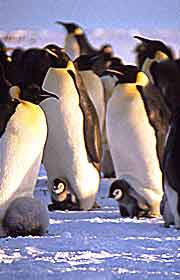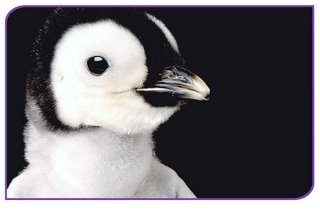Nature's Formula: A Dash of Brilliance, An Ounce of Madness
 March of the Penguins - If you don't know what this is, you're missing out.
March of the Penguins - If you don't know what this is, you're missing out.For those who haven't seen it, it's a documentary on Emperor penguins in the South Pole and their yearly adventures in raising a baby. Summary: The penguins leave the water once a year and walk 70 miles to get to the breeding ground - the place where they were born. Once there, they find a mate, do their thing, and a month or so later, an egg is born. Mom needs to get back to the sea to feed, but before that can happen, she has to pass the egg to the father. Given the lack of hands and and the freezing conditions, the egg transfer is a tricky process that requires both speed and skill. Once the father gets the egg, he spends the next few months carrying it on top of his feet, shuffling around while balancing the egg. All this is done in weather that ranges from a sizzling -50 degrees WITH the sun to -100 without, days to months without sun at all, and the occasional blizzard with 100 miles per hour winds thrown in for good measure. When the eggs hatch, both fathers and babies starve as they wait for Mom to come back. Meanwhile, the mothers have made it back to sea, fed for themselves and their babies, and hurry the 70 mile trip back to feed their young. When Mom makes it there, she switches places with Dad, who walks 70 miles to fill his belly. They repeat this until the little penguins are old enough to survive on their own.

There are immense dangers at all steps of this process. Penguins can die on the initial march to the breeding ground. Penguins may fail to transfer the egg safely. Or the egg can make it onto Dad's feet, but die in one of those storms as Dad struggles to move against blinding harsh winds. Fathers risk death in the process of protecting his egg or waiting for Mom. Mothers can die during feeding, victim of a predator. Both Mothers and Fathers may die on any one of the return marches, and all has gone well, baby could still meet its demise in its first storm, or as the next meal of a seagull or other predator.
Thoughts after the documentary:
- Thank you Moms and Dads for all the sacrifices you have made for us.
- I should never complain! How can we pity ourselves when these poor things suffer in bitterly cold weather, months since their last meal, and fight for survival against deafening arctic winds?
- What drives these penguins to do this year after year? What drives salmon to make a death swim to the place of their birth to lay eggs? And similarly, what drives young men and women to give up twenty, thirty, forty years of their lives to give birth and raise children? Is it the brilliance of nature, a touch of madness, or really, a combination of the two?


0 Comments:
Post a Comment
<< Home